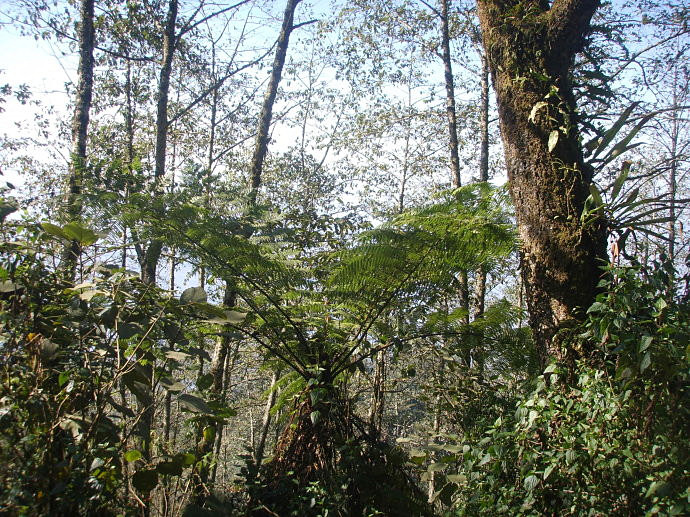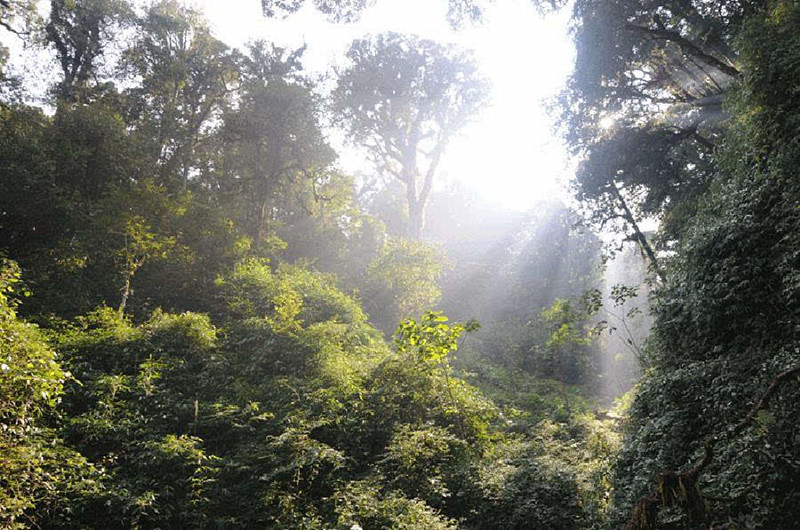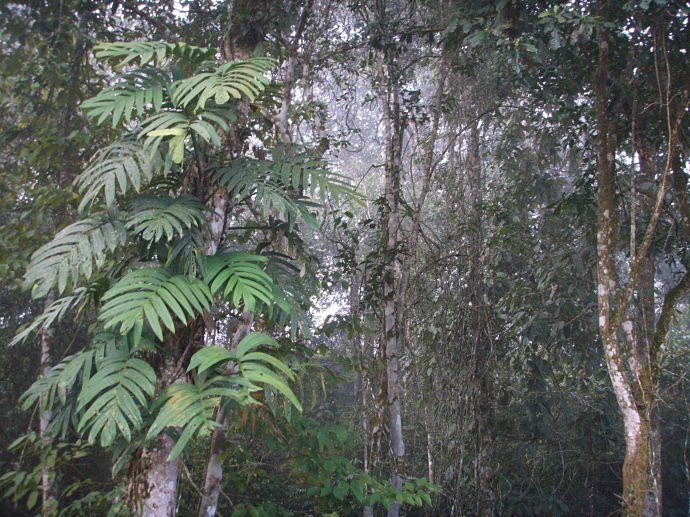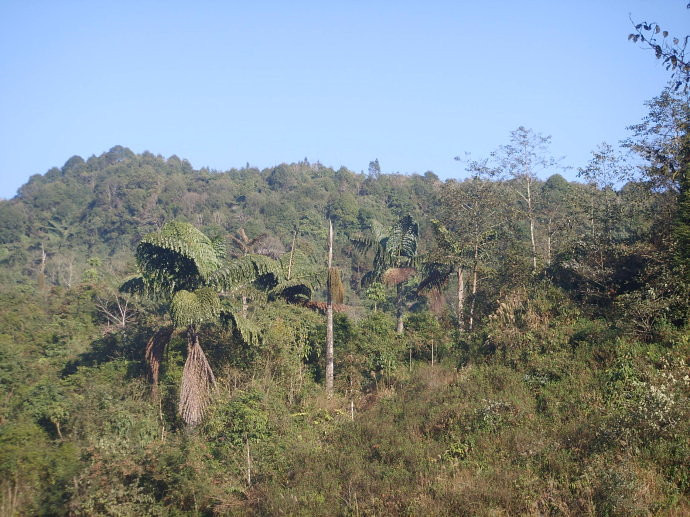
Gulinqing Primary Forest in Maguan County, Wenshan
Chinese Name: 马关县古林箐原始森林
English Name: Gulinqing Primary Forest in Maguan County, Wenshan
Location and Climate:
Gulinqing Township is located in a tropical and subtropical region with a complex topography and intersecting rivers that create a vertical climate pattern: hot in river valleys, warm in mid-mountain areas, and cool in high mountains. It is situated in the southwestern part of Maguan County, approximately 89 kilometers from the county seat, between latitudes 22°40′58″ to 22°53′48″ and longitudes 103°52′53″ to 104°01′42″.
The area lies at the intersection of two prefectures (Wenshan and Honghe) and three counties (Maguan, Hekou, and Pingbian). It borders Qiaotou Township of Hekou County to the east, Nanxi Town and Laofan Village of Hekou County to the south, Baihe Township of Pingbian County to the west, and Miechang Township to the north.
Ecological Significance:
The Gulinqing Provincial Nature Reserve spans the junction of Maguan, Hekou, and Pingbian counties and features a unique tropical rainforest ecosystem. It is known for its ancient trees, the largest and most well-preserved Xianmu forest ecosystem in China, the largest Wangtian tree, and the critically small population of Yunnan camellia. Entering Gulinqing feels like stepping into a “museum” of ancient plants.
Biodiversity and Conservation:
- Wangtian Tree: As an indicator species of tropical rainforests, the Gulinqing Reserve has recorded the largest Wangtian tree in terms of trunk diameter, measuring 2.4 meters. Historically, Wangtian trees faced extensive logging and are now near extinction. In Gulinqing, these trees are found in peak cluster rocky areas below 800 meters, with some interspersed with Xianmu forest, covering about 5000 acres.
- Xianmu: Locally known as “firewood tree,” Xianmu forests in Gulinqing Reserve are the largest and most well-preserved in China, covering approximately 13000 acres. Xianmu grows in rocky peak areas and requires a unique habitat: “no stone, no wood.” It is found on the eastern slopes of the Nanxi River, between 429 meters and below 1000 meters. The largest recorded tree has a trunk diameter of 3.5 meters and an age of over 2000 years.
- Slow Loris: Known locally as “lazy monkeys,” slow lorises are a critically endangered first-class protected wildlife species. The Gulinqing Reserve and its nearby ecological public welfare forest areas in southwestern Maguan County are major habitats for these primates. They live in tropical rainforests and subtropical evergreen broadleaf forests, are slow-moving, solitary, nocturnal, and primarily feed on insects, fruits, and bird eggs, with a particular fondness for wild honey.
- Round-Nosed Giant Lizard: Also called “spiritual insect” locally, this critically endangered first-class protected species is found in the Gulinqing Reserve’s Huangjiangping, Xiaoluoshuidong, and Huayu Cave areas. These amphibian reptiles inhabit lower altitude river valley basins with mixed shrubs and grass, near streams or underground rivers. They live in burrows by mountain streams, can climb trees and swim, and feed on rodents, snakes, chickens, and decaying animal carcasses. Due to hunting and habitat destruction, they have become extremely rare in Gulinqing and Yunnan. However, recent habitat restoration has led to sightings of the species in Huayu Cave and Xiaoluoshuidong, indicating progress in conservation efforts.
Natural Beauty and Ecological Value:
Traversing the valley, one encounters knee-deep wormwood paths, shaded by trees, with long vines climbing the trees, bizarre rocks covered in moss, and babbling streams—an exquisite display of pristine ecology.
Conservation Efforts:
In recent years, Maguan County has firmly committed to eco-priority and green development. The county continues to optimize its green ecological pattern and strengthen ecological barriers, laying a solid foundation for a more comprehensive biodiversity conservation system.
Vision for the Future:
A harmonious coexistence with nature, where mountains remain green, waters flow long, air stays fresh, and humans live in harmony with the environment, represents the most beautiful homeland.





 7 Days GolfingTour
7 Days GolfingTour
 8 Days Group Tour
8 Days Group Tour
 8 Days Yunnan Tour
8 Days Yunnan Tour
 7 Days Shangri La Hiking
7 Days Shangri La Hiking
 11 Days Yunnan Tour
11 Days Yunnan Tour
 6 Days Yuanyang Terraces
6 Days Yuanyang Terraces
 11 Days Yunnan Tour
11 Days Yunnan Tour
 8 Days South Yunnan
8 Days South Yunnan
 7 Days Tea Tour
7 Days Tea Tour
 8 Days Muslim Tour
8 Days Muslim Tour
 12 Days Self-Driving
12 Days Self-Driving
 4 Days Haba Climbing
4 Days Haba Climbing
 Tiger Leaping Gorge
Tiger Leaping Gorge
 Stone Forest
Stone Forest
 Yunnan-Tibet
Yunnan-Tibet
 Hani Rice Terraces
Hani Rice Terraces
 Kunming
Kunming
 Lijiang
Lijiang
 Shangri-la
Shangri-la
 Dali
Dali
 XishuangBanna
XishuangBanna
 Honghe
Honghe
 Kunming
Kunming
 Lijiang
Lijiang
 Shangri-la
Shangri-la
 Yuanyang Rice Terraces
Yuanyang Rice Terraces
 Nujiang
Nujiang
 XishuangBanna
XishuangBanna
 Spring City Golf
Spring City Golf
 Snow Mountain Golf
Snow Mountain Golf
 Stone Mountain Golf
Stone Mountain Golf















